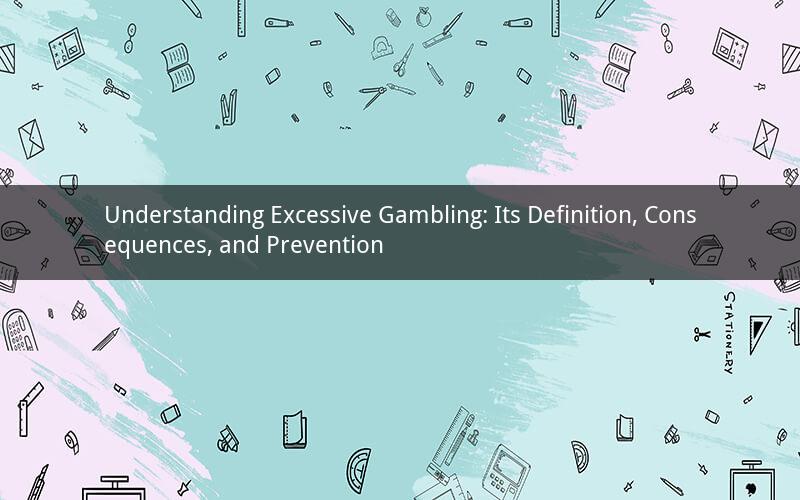
Excessive gambling, also known as problem gambling or compulsive gambling, refers to an uncontrollable urge to gamble despite the negative consequences. It is a form of addictive behavior that can affect individuals, families, and communities. In this article, we will delve into the definition of excessive gambling, its consequences, signs of problem gambling, and ways to prevent and overcome it.
Definition of Excessive Gambling
Excessive gambling is characterized by an inability to control or stop gambling, despite experiencing negative outcomes. The person may spend an excessive amount of time, money, and energy on gambling activities, leading to significant problems in various aspects of their lives. According to the American Psychiatric Association's Diagnostic and Statistical Manual of Mental Disorders (DSM-5), excessive gambling is classified as an impulse-control disorder.
Consequences of Excessive Gambling
1. Financial problems: Excessive gambling can lead to significant financial difficulties, including debt, loss of savings, and bankruptcy. The individual may borrow money or steal to fund their gambling habits.
2. Relationship issues: The person's gambling addiction can strain relationships with family, friends, and loved ones. They may become distant, secretive, or even abusive due to their gambling habits.
3. Work and career: Excessive gambling can lead to job loss, reduced productivity, and missed opportunities for career advancement. The individual may prioritize gambling over work responsibilities.
4. Mental health problems: Problem gambling is often associated with mental health issues, such as depression, anxiety, and substance abuse. The individual may turn to alcohol or drugs to cope with the stress and guilt associated with their gambling habits.
5. Physical health problems: The individual may experience physical health issues due to stress, sleep deprivation, and poor nutrition. Excessive gambling can also lead to health conditions related to risky behaviors, such as contracting a sexually transmitted disease or suffering from a gambling-related injury.
Signs of Problem Gambling
1. Preoccupation with gambling: The individual constantly thinks about gambling, planning their next bet, or reliving past gambling experiences.
2. Inability to control gambling: The person struggles to control or stop their gambling, even when faced with negative consequences.
3. Increasing stakes: To sustain the thrill of gambling, the individual may be inclined to bet larger amounts of money or take more risks.
4. Lying to hide gambling: The person may lie to family, friends, or professionals about their gambling activities to avoid judgment or criticism.
5. Borrowing money: To fund their gambling habits, the individual may borrow money from friends, family, or financial institutions.
6. Risking important relationships: The person may put their relationships at risk by using money that should be allocated for family needs or important expenses.
7. Engaging in risky behavior: The individual may engage in illegal activities or take on high-risk endeavors to support their gambling habit.
Prevention and Overcoming Excessive Gambling
1. Education and awareness: Increase awareness about the risks and consequences of excessive gambling. Encourage individuals to seek help if they suspect they may have a gambling problem.
2. Setting limits: Set a budget for gambling activities and stick to it. Establish time limits for gambling sessions to prevent excessive spending and time wasted.
3. Support networks: Seek support from friends, family, or support groups. Engaging with others who have experienced similar challenges can provide comfort and guidance.
4. Professional help: If the individual struggles with an excessive gambling problem, seek professional help from a therapist or counselor specializing in addiction and mental health.
5. Self-help strategies: Practice self-help strategies such as mindfulness, relaxation techniques, and problem-solving skills to manage cravings and cope with stress.
FAQs
1. What is the difference between gambling and problem gambling?
Answer: While gambling is a form of entertainment, problem gambling involves an uncontrollable urge to gamble, leading to negative consequences in various aspects of life.
2. Can excessive gambling lead to addiction?
Answer: Yes, excessive gambling can lead to addiction, similar to other addictive behaviors such as alcohol or drug abuse.
3. How can I tell if I or someone I know has a gambling problem?
Answer: Look for signs such as preoccupation with gambling, inability to control gambling, increasing stakes, lying about gambling, and negative consequences in relationships, work, or finances.
4. Are there any treatments available for excessive gambling?
Answer: Yes, various treatments are available, including therapy, support groups, and self-help strategies. Professional help from a therapist or counselor specializing in addiction can be beneficial.
5. Can problem gambling be prevented?
Answer: Yes, prevention involves education, setting limits, building support networks, and seeking professional help when needed. By being aware of the risks and consequences, individuals can take steps to prevent excessive gambling.